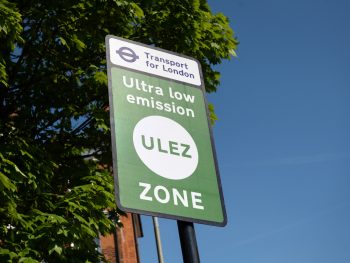The Ultra Low Emission Zone (ULEZ) is to be expanded across all London boroughs from next August, more than doubling the zone’s existing area.

The expanded scheme will come into effect from Tuesday 29 August 2023 and will operate across all London boroughs up to the existing Low Emission Zone boundary.
Mayor of London Sadiq Khan said the move would tackle the triple threats of air pollution, the climate emergency and congestion, ensuring five million more Londoners can breathe cleaner air.
The existing ULEZ is credited with having reduced roadside pollution levels by 44% in central London and 20% in inner London.
As the cost-of-living crisis continues to impact people across the UK, the Mayor also announced a brand-new £110m scrappage scheme to support Londoners on lower incomes, disabled Londoners, charities and small businesses and sole traders. Successful scrappage applicants will receive a grant to scrap or – in a new move – retrofit their vehicle for certain vans and minibuses. Successful car owners can opt to receive a smaller grant accompanied by up to two free annual bus and tram passes, which would give them a higher financial package.
Khan also revealed a package to support more disabled Londoners than ever before, including an extended grace period to October 2027, while the expanded ULEZ will be accompanied by the biggest ever expansion of bus network in outer London.
According to the Mayor, expanding the ULEZ London-wide will “strike the best balance between maximising the health and environmental benefits for Londoners while minimising the cost to drivers”. Toxic air caused by road traffic is still leading to thousands of deaths a year, and the greatest number of deaths attributable to air pollution are in London’s outer boroughs, which the ULEZ doesn’t currently cover.
Expanding the ULEZ London-wide will save 27,000 tonnes of CO2 in outer London, nearly double that which the central London ULEZ achieved in its first year of operation. It’s also forecast to make further progress to reduce air pollution, by reducing nitrogen oxides (NOx) emissions from cars and vans in outer London by 10 and 7% respectively, and reducing PM2.5 car exhaust emissions in outer London by nearly 16%, benefiting five million outer London residents.
Plans for the ULEZ expansion were revealed earlier this year and a public consultation saw 59% of respondents agree that more needed to be done to tackle toxic air.
Khan said the expansion had not been an easy decision.
“We have too often seen measures delayed around the world to tackle air pollution and the climate crisis because it’s viewed as being too hard or politically inconvenient. But there’s no time to waste when people’s lives are on the line and we are facing a climate crisis. As mayor, I’m not willing to turn a blind eye because it’s clear the cost of inaction – to our economy, to livelihoods, to the environment and the health of Londoners – would be a far too high a price to pay. Expanding ULEZ is the right choice for our city and something that I know will help us to continue building a better, greener, fairer and healthier London for everyone.”
Vehicles exempt from the ULEZ include petrol cars/vans that meet Euro 4 standards, diesel cars/vans that meet Euro 6 standards, plus fully electric, plug-in hybrid and hybrid vehicles. A daily charge of £12.50 applies to those vehicles not exempted.
Business group Logistics UK said the announcement would provide an opportunity for operators within the capital to take active steps to plan vehicle replacement or upgrades. But Michelle Gardner, deputy policy director, added that flexibility in implementation may be required as London works to improve its air quality.
“The quality of the air we breathe affects us all, and logistics operators have already made huge strides in reducing the industry’s emissions while delivering everything which Londoners need every day. The announcement of the date of the ULEZ expansion will enable businesses to speed up the planning of their vehicle upgrade or replacement programmes to ensure compliance.
“However, with many vehicle manufacturers unable to fulfil new orders due to the worldwide shortage of parts and microchips, and very limited opportunities available for retrofitting existing vehicles, it is vital that the Mayor and his team provide some flexibility in the implementation of the new rules and access to the proposed £110m scrappage scheme for commercial vehicle operators.”
However, the National Franchised Dealers Association (NFDA) slammed the move. Sue Robinson, chief executive, commented: “Whilst NFDA understands the importance of tackling air pollution in the capital and to combat climate issues, we still believe that this ULEZ expansion proposal is flawed. The ULEZ expansion will undoubtedly have a disproportionate and adverse effect on London’s most deprived communities and motorists.
“This £12.50 daily charge will hit businesses, key workers and less affluent families the hardest and the additional cost to some of London’s poorest communities will push some families over the brink and force a reduction in their access to private mobility.
“This move is during one of Britain’s worst cost-of-living crises, rising inflation and steep energy prices. We do not believe that this has been fully considered by Transport for London and looks more and more to be a money generating scheme for TfL.”

